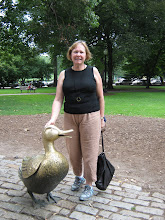Despite the fact that I keep reading that many teacher librarians have radically weeded the traditional literature section of their libraries (the 398.2s) because they perceive these stories to be sexist and racist, I see them as part of history and a very strong oral tradition of times gone past. Every culture has a version of Cinderella. Wouldn't it be sad if English speaking children did not know at least the Perrault version with the fairy godmother? I would like them to know the Grimm version too! Disney has romanticised many fairytales and made them into films and my young students just think they are 'films'. They are amazed when I tell them there was a book first for Pinocchio, the Little Mermaid, and even for Shrek.
My school library does have a large collection of traditional stories, in mainly one story per picture book format. The girls clamour over the Sarah Gibb's versions of tales and little wonder the art work is wonderful. Any story with princesses is borrowed. The girls all seem to say they like Rapunzel best. I then introduce them to The Twelve Dancing Princesses, Snow White and Rose Red and The Frog Prince. I do like the stories where the prince has been duped by a spell! Then they can read Sleeping Beauty and Snow White.
I really enjoy the language and repetition in good retellings of The Three Billy Goats Gruff, The Elves and the Shoemaker and Rumplestiltskin.
The younger teachers at school are in a big hurry to introduce their students to fractured fairytales or spoofs because they think they are fun. However often they don't work as well as they should because the very young students have very little knowledge of the traditional version.
If you are looking to expand this section of your library look for beautifully illustrated versions such as those by Sarah Gibb, Bernadette Watts, Paul Zelinsky, Charles Santore, Jerry Pinkney, Gerda Muller, Rachel Isadora, Kinuko Y Craft, and Ruth Sanderson. Joy Cowley has a series of World Classics too.
If like me, you have pre-schoolers using the library, look for the lift the flap versions by Stephen Tucker and Nick Sharratt, the Flip-Up Fairytales by Child's Play and the Ed Bryan ones from Nosy Crow.

















No comments:
Post a Comment